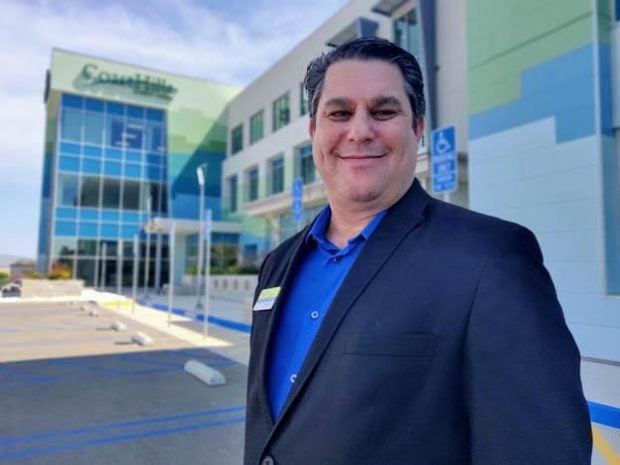 Chico Lusby, vice president of IT at CoastHills Credit Union. (Source: CoastHills)
Chico Lusby, vice president of IT at CoastHills Credit Union. (Source: CoastHills)
A credit union executive decided to reveal his 30-year secret, hoping it will inspire and support those suffering from the many difficult consequences of the coronavirus crisis.
Chico Lusby, vice president of IT at the $1.2 billion CoastHills Credit Union in Santa Maria, Calif., was homeless in the 1990s, living out of a pick-up truck with a camper shell, subsisting on the cheapest food he could barely afford, working as a pizza delivery guy and attending classes at a community college.
From that life-changing experience, the senior executive learned two valuable lessons: Never, ever give up no matter how bad things get, and always give back to help others who are struggling through difficult days.
Lusby, 50, mustered the courage to tell his story because he believes people need to hear positive messages of inspiration and hope, as he was filled with inspiration and hope when hearing a speech by the late North Carolina University basketball coach, Jimmy Valvano, who led his team to win the 1983 national championship against improbable odds.
Shortly before he died of cancer in 1993, Valvano gave a memorable speech at ESPN's Espys that announced his organization for cancer research and its motto, "Don't give up … don't ever give up."
"He said in that speech that what you donate might not save his life, but it might save somebody that you love," Lusby said. "I wanted to tell people my story and just tell them, don't give up. Now I have a chance to not only give back to somebody who helped me when I needed it. To raise awareness and hopefully inspire people to donate and volunteer their time, it just was the right place at the right time for me to tell the story."
Through the credit union's employee giving program, "I'm All In," Lusby has directed a $1,000 sponsorship to the Lompoc Food Pantry, the same organization that gave him food when he was homeless.
"I never would have been able to make my career into what it is had [Lompoc Food Pantry] not been there," he explained. "I probably would have had to drop out of school because that was the only way I was going to be able to buy food and have somewhere to live."
Lusby parked his pick-up truck in an alley to sleep at night. When morning broke, he snuck into a friend's house to take a shower. In exchange, Lusby drove his friend to a community college where Lusby was also enrolled.
After classes, he worked at Domino's Pizza, closed up the shop at 2 a.m., slept in his truck until 7 a.m., showered at his friend's house, attended classes and headed back to work. Lusby lived this way every day for about a year.
"Friends would invite me over for a party and I'd still be wearing my Domino's uniform," he remembered. "People would just rip on me all the time about that, but the simple fact of the matter is that Domino's had laundry service, so I had a fresh new clean shirt every day."
Except for one friend, Lusby never told his other friends that he was homeless because he didn't want anyone to feel sorry for him and he was embarrassed about it.
After finding out that Lusby was eating just one meal a day or sometimes going totally hungry, his friend suggested the Lompoc Food Pantry.
"I walked in and tried to explain myself, but no questions asked, they gave me this huge load," he recalled. Lusby walked out of the pantry with a gallon of milk, carton of eggs, loaf of bread and what he described as "this huge thing of peanut butter that was paint-bucket sized."
The weekly groceries he received from the panty enabled him to eventually save up enough money to rent a studio apartment, ending his homelessness.
He quit his Domino's job after a landscaping supply center hired him. He later got his commercial driver's license to make deliveries.
It wasn't until he was visiting with a friend during his college days that Lusby learned he had a natural knack for working on computers.
"My friend had this new computer with this thing called Windows on it. I'd never seen Windows before and I had no idea what a mouse was," he said. "My friend was getting really frustrated trying to figure out how to make the thing work because everything was DOS-based at that time. I sat down and started clicking stuff and started digging and fixed it for him. I don't even remember what it was that I did, but it suddenly hit me right there that maybe I'm a little more intuitive with computers than most people."
Lusby changed his major from sociology to computer science. After graduating with a four-year degree in that discipline, he held several IT jobs and worked as an independent computer consultant before joining CoastHills' IT department as a network administrator in 2003.
© 2024 ALM Global, LLC, All Rights Reserved. Request academic re-use from www.copyright.com. All other uses, submit a request to [email protected]. For more information visit Asset & Logo Licensing.









